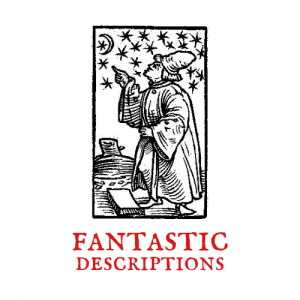As a long-time RPG player, reader of fantasy fiction, and published author, I’ve often thought that one of the greatest strengths of the game of D&D (and by extension, other RPGs) is the way that so much can be accomplished simply through language. Words make the world. This blog and the soon to be launched podcast and YouTube channel examine some ways we raise the bar on our narrative storytelling as DMs and players.
Despite the addition of miniatures, battlemaps, virtual tabletops, soundboards, 3D terrain, and other technological advances, at its heart, a role playing game is about story — and about how its told. A good story requires memorable characters, interesting challenges, a strong sense of place, and some sort of emotional and narrative arc (we want to feel like we’re getting somewhere). For all the things we buy, make, or use to make our games more immersive, often what we really long for is a better grasp on narrative description, the fundamental component in theater of the mind style play.
I should note here that I’m not arguing for the abandonment of miniatures and terrain — I do enjoy crafting terrain and am avid follower of a number of great terrain crafters on YouTube (my list keeps growing, so I’ll just use a separate post to list my favorites and discuss what we can learn about description from terrain crafting). Likewise, I also find there’s great advice and insight on running the game to be found in a wide range of podcasts and YouTube from folks and channels like Matt Mercer, Matt Colville, Guy of How to be a Great Game Master, Monarch’sFactory, and… here too the list gets a bit long).
That said, there still seems to be a dearth of tips, training, and/or tutorials on how to improve your narrative storytelling technique. Often the advice is good, but barely scrapes the surface. Most of it tends to touch on one or more of the following tips:
- Engage more of the senses, not just sight (Give the players sounds, smells, and textures).
- Build your vocabulary (Read lots of books, especially fantasy books. Study how they describe things).
- Play in a lot of games (Watching other DMs will help you get a sense of what other people do to describe or narrate)
- Show if you can’t tell (Use props, pictures, and soundboards if you don’t feel confident about your ability to describe certain people, places, or things)
- Not all of us are Matt Mercer (You do you. If your players are happy, that’s all that matters).
Still, on some level there remains a sense that good DMing and good narration isn’t something you can be taught directly, but something you just wrestle with and try to figure out on your own. And along with that sentiment is the feeling that some people are just naturally good at it.
Personally, I suspect becoming good at narrative description as DM/GM is a lot like becoming good at writing poetry. Although there’s a component that is natural talent (some people are really imaginative and can see connections that others miss, making them especially skilled at sensing the intuitive ways in which the individual details that make up descriptions and poems come together), there’s a lot of both tasks which really have more to do with understanding how word order, perspective, and emotion operate in a sentence or line. What years of creative writing has taught me is that the secret ingredient to becoming a good writer is informed practice – it’s not enough to write or DM for years, we need to understand:
- what it is that we’re doing that’s working
- what we’re doing that isn’t working
- why this is the case.
I firmly believe that it’s possible for almost every DM or GM to achieve a general competence and confidence in describing the people, places, and things to make up the world they are describing to their players. And furthermore, that one doesn’t need to master all of these skills and techniques, even gaining a greater understanding of one or two of these points can make a huge difference in the quality of narration and the confidence with which you describe things to your players.
My goal for Fantastic Descriptions is to dig below the surface and really explore how we can use language more effectively to describe the world in compelling detail while also bringing our players deeper into the world of imagination. I’ll be drawing on my own studies in poetry, psycho-linguistics, literary theory, film theory, and spoken word performance to make sense of what it is we do as DM/GMs when we narrate scenes, describe people and objects, and strive to evoke a sense of actually being in a place. I’ll be pulling from literature, theory, and RPG texts, as well as creating some guidelines and tools that will help others (and myself) become better storytellers.
Stay tuned! More coming.

